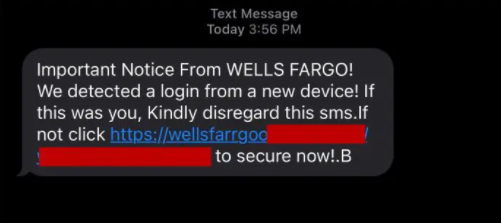New phishing scams targeting your bank account

Your personal information is precious to cybercriminals, but they also want to make some hard cash. When they are not selling malware or sensitive data on the Dark Web, many work on financial phishing scams.
While the tactics often vary, the end goal is to steal as much of your money as possible. And it’s not just one bank’s customers who are targeted. Over the last few months, many scams used fraudulent details for almost every bank in the U.S.
Read on for some of the most prominent phishing scams today and how to protect yourself.
Chase

A wrestling announcer recently revealed how he almost fell victim to a scammer who pretended to be from Chase Bank. As with many scams, it started with a text message about a suspicious transaction. If you reply to the message to stop it, the scammer will call you from a spoofed number that resembles Chase.
The scammer will then ask you to verify your details, such as your name, account number and email address. But that is exactly what they are after. Scammers can easily access your account and steal your money with little but crucial information.
Citibank

In a slightly different twist, criminals use fake Citibank emails to spur victims into action. The phishing emails contain Citibank’s logo and sender address and are often free of tell-tale typos. The email claims that your account is temporarily suspended and you can unlock it by clicking on a link.
But the link goes to a spoofed version of Citibank’s website that can look genuine at first glance. But, if you try to log in using your credentials, the criminals capture the information and clean out your bank account.
Citizens Bank

Claiming that your Citizens Card is temporarily blocked, criminals hope that you will click on the link in the text message. As with so many phishing scams, an eagled-eyed user will quickly spot that the URL is fake. If you do click on it, the link takes you to a phony website where scammers steal your details when you log in.
Wells Fargo

Criminals warn you about a suspicious login attempt by using Wells Fargo as bait. The fake message claims that an unauthorized transaction occurred or that a new login device has been detected. The message contains a link, but it takes you to a fake website where criminals capture your details.
Zelle
Zelle is a popular mobile payment app, but it has seen its fair share of scams. Like others, criminals will send you a text or email to confirm a significant transaction through the platform.
When you deny authorization, the criminals will walk you through reversing the transaction. But the transaction is fake, and the process helps the thieves rip you off.
Spoofing any bank’s name
Typically, when you get a text message from your bank about suspicious transactions, it should raise concern. First, it might be a legitimate message from your bank about financial activities. But it might also be scammers that sent you a fake fraud alert.
Criminals spoof a bank’s messages by using the same language and hoping that you will act swiftly. If you respond to the fake message, the criminals will explain how to reverse the transaction. But in reality, they’re getting your credentials to steal from you.
What you can do about it
There are a few things that you can look for if you receive a message about an unauthorized transaction or fake suspension alerts.
- Never give out personal information if you don’t trust the person or can’t verify their identity. Criminals only need your name, email address and telephone number to rip you off.
- Don’t respond to the message if you receive a fraud or suspicious transaction alert. Instead, phone your bank directly and speak to a fraud consultant.
- Use two-factor authentication (2FA) for better security. Tap or click here for details on 2FA.
- Pay close attention to the URLs in any emails or text messages. Check for slight changes in the letters, any misspellings or suspicious characters.
- Don’t click on links and attachments that you receive in unsolicited emails.
- Always have a trusted antivirus program updated and running on all your devices. We recommend our sponsor, TotalAV. Right now, get an annual plan with TotalAV for only $19 at ProtectWithKim.com. That’s over 85% off the regular price!
Keep reading
Do you use CashApp, Zelle or Venmo? Don’t make this mistake
These bank suspension alerts are fake – Don’t fall for them
Tags: Chase, Citibank, cybercriminals, Dark Web, malware, phishing scams, security, sensitive data, spoofing, Wells Fargo, Zelle
